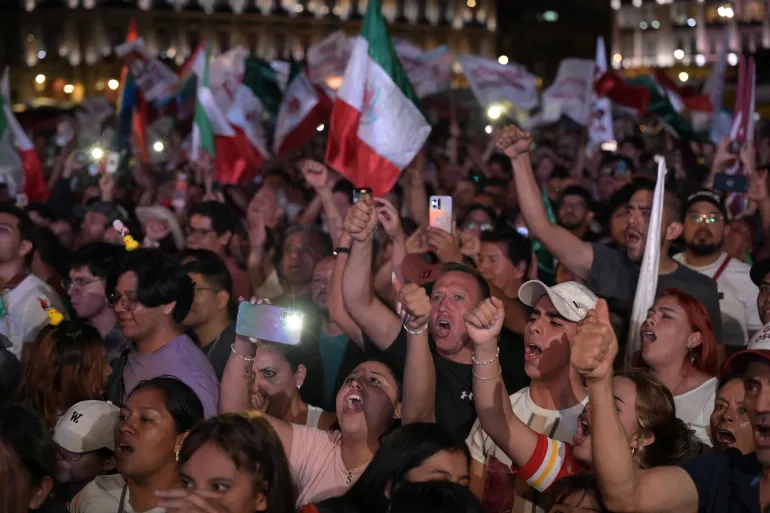Mexico’s Election: A Victory for Organized Crime
LATIN AMERICA AND THE CARIBBEAN, 10 Jun 2024
Belén Fernández | Al Jazeera – TRANSCEND Media Service

Supporters of Morena party candidate Claudia Sheinbaum celebrate at Zocalo Square in Mexico City, 3 Jun 2024. [Yuri Cortez/AFP]
Under Claudia Sheinbaum’s presidency, organized crime will likely be calling the shots.
3 Jun 2024 – On June 2, Mexico elected Claudia Sheinbaum as its first woman president. The 61-year-old scientist served as mayor of Mexico City from 2018 until 2023 and is the protégée of outgoing President Andrés Manuel López Obrador (AMLO), to whose Morena party she belongs and in whose shadow she will now govern.
In the largest election in Mexico’s history, Sheinbaum faced off against ex-senator Xóchitl Gálvez, head of a conservative coalition. In addition to the presidential race, Mexicans also voted for candidates contesting more than 20,700 federal and local positions countrywide.
In the run-up to the election, observers relentlessly cast the prospect of an impending female head of state in Mexico as a victory for women’s empowerment, although a glance at facts on the ground suggests the prematurity of any such celebration.
Back in 2019, Sheinbaum, the first female mayor of Mexico City, promised to eradicate violence against women. During her tenure, however, the femicide epidemic in the Mexican capital – and the rest of the country – continued to rage.
Mexico currently sees at least 10 women and girls killed on a daily basis, with tens of thousands of women missing. The vast majority of femicides go unprosecuted.
Of course, the surge in femicides occurs within a general context of violence; in the first four and a half years of AMLO’s term, Mexico registered 160,594 homicides, while the estimated number of missing people has now surpassed 111,000 – a figure AMLO has preferred to drastically lowball.
The outgoing president has also found it prudent to accuse people overly concerned with the search for the missing of suffering from “delirium of necrophilia”.
The violence extends to the political realm, too. More than two dozen candidates were assassinated ahead of the June 2 polls, and hundreds more dropped out of their races. In April, two mayoral contenders were found dead on a single day.
Some might go as far as to call it a “delirium of necrophilia”.
The pre-electoral spike in political killings is attributed primarily to cartels and other organised crime outfits conducting their own form of elections – if you will – by eliminating unfriendly candidates. After all, there is no time like the biggest election in Mexican history to show who will really be calling the shots in the coming years.
In March, for example, the mayor of the diminutive coastal town of Zipolite in Mexico’s southern Oaxaca state – my intermittent home – was fatally shot in broad daylight outside the local municipality building. The incident went almost entirely unreported in the Mexican press, but the rumour in town was that “they” had warned him – “they” being the dominant drug trafficking group in the area, whose operations the mayor was apparently endeavouring to obstruct.
I left Zipolite in April but recently phoned a Mexican friend there to inquire about candidates for the mayor’s replacement. His response: “No one wants the job.”
Multiply the case of Zipolite across the entire expanse of Mexico, and you get an idea, perhaps, of just how “free” Sunday’s election really was.
And while the United States prefers to categorically blame Mexico’s violence on drug cartels and end the discussion there, the truth of the matter is that the US itself plays an outsize role in maintaining the violent landscape south of the border. For one thing, the simultaneous demand for and criminalisation of drugs in the US is what spawned the whole cartel business in the first place.
Add to that the US demand for undocumented labour and criminalisation of migration, on which front AMLO has been only too eager to do the gringos’ dirty work – a pattern Sheinbaum will no doubt continue.
As unprecedented numbers of asylum seekers now traverse Mexico to reach the US, drug trafficking outfits have expanded their services to include people smuggling, as well. People on the move are abused and extorted at every turn by agents of the state and organised crime groups alike, often working in cahoots.
I had the opportunity to experience such collaborative efforts firsthand when in March I drove from Oaxaca to the neighbouring state of Chiapas to pick up two young Venezuelan friends of mine who had just crossed into Mexico from Guatemala. I had initially offered to pay acquaintances in Chiapas to retrieve them from the border but had been politely informed: “If we pick up migrants, the cartels will kill us.”
Our ensuing daylong odyssey entailed extortion by every possible branch of the Mexican immigration and security apparatus, including AMLO’s beloved National Guard, three members of which cornered us in a car park with their pick-up truck after having been tipped off by migrant smugglers that I was interfering with business.
Disgruntled to hear that all of my pesos had already been distributed to other Mexican officials, the National Guard officers suggested that I proceed to a nearby petrol station to conduct a hefty payment on my credit card, which the station attendant would then pass along to the officers in cash.
Created in 2019, the National Guard has been accused of torture, extrajudicial killings, forced disappearances and sexual violence against asylum seekers. Now, Sheinbaum has optimistically expressed her hope that the National Guard will “be closer to the public, act like a local police, really become the first responders”.
Speaking of criminal actors, Sheinbaum also hopes to boost cooperation with the US in the realm of so-called “free trade” despite the concept’s rather sordid history in Mexico. Recall that the implementation of the US-imposed North American Free Trade Agreement (NAFTA) in 1994 destroyed millions of livelihoods in the country while fuelling poverty and forcing countless Mexicans into narco-trafficking-related jobs in order to survive. That is when lethal violence against women soared.
Anyway, what is US-imposed capitalism if not very organised crime?
As Mexico now prepares for a new administration, it is safe to assume that violence, official corruption, and impunity will remain the name of the game. A woman may have won the Mexican election, but the real winner is organised crime – in every sense of the term.
_____________________________________________
 Belén Fernández is an Al Jazeera columnist and a contributing editor at Jacobin Magazine. She has written for the New York Times, London Review of Books, Current Affairs, and Middle East Eye, among numerous other publications. She is the author of Checkpoint Zipolite: Quarantine in a Small Place (OR Books, 2021), Exile: Rejecting America and Finding the World (OR Books, 2019), Martyrs Never Die: Travels through South Lebanon (Warscapes, 2016), and The Imperial Messenger: Thomas Friedman at Work (Verso, 2011).
Belén Fernández is an Al Jazeera columnist and a contributing editor at Jacobin Magazine. She has written for the New York Times, London Review of Books, Current Affairs, and Middle East Eye, among numerous other publications. She is the author of Checkpoint Zipolite: Quarantine in a Small Place (OR Books, 2021), Exile: Rejecting America and Finding the World (OR Books, 2019), Martyrs Never Die: Travels through South Lebanon (Warscapes, 2016), and The Imperial Messenger: Thomas Friedman at Work (Verso, 2011).
Go to Original – aljazeera.com
Tags: Cartels, Corruption, Elections, Latin America Caribbean, Mexico, Organized crime, Women
DISCLAIMER: The statements, views and opinions expressed in pieces republished here are solely those of the authors and do not necessarily represent those of TMS. In accordance with title 17 U.S.C. section 107, this material is distributed without profit to those who have expressed a prior interest in receiving the included information for research and educational purposes. TMS has no affiliation whatsoever with the originator of this article nor is TMS endorsed or sponsored by the originator. “GO TO ORIGINAL” links are provided as a convenience to our readers and allow for verification of authenticity. However, as originating pages are often updated by their originating host sites, the versions posted may not match the versions our readers view when clicking the “GO TO ORIGINAL” links. This site contains copyrighted material the use of which has not always been specifically authorized by the copyright owner. We are making such material available in our efforts to advance understanding of environmental, political, human rights, economic, democracy, scientific, and social justice issues, etc. We believe this constitutes a ‘fair use’ of any such copyrighted material as provided for in section 107 of the US Copyright Law. In accordance with Title 17 U.S.C. Section 107, the material on this site is distributed without profit to those who have expressed a prior interest in receiving the included information for research and educational purposes. For more information go to: http://www.law.cornell.edu/uscode/17/107.shtml. If you wish to use copyrighted material from this site for purposes of your own that go beyond ‘fair use’, you must obtain permission from the copyright owner.
Join the discussion!
We welcome debate and dissent, but personal — ad hominem — attacks (on authors, other users or any individual), abuse and defamatory language will not be tolerated. Nor will we tolerate attempts to deliberately disrupt discussions. We aim to maintain an inviting space to focus on intelligent interactions and debates.
Read more
Click here to go to the current weekly digest or pick another article:
LATIN AMERICA AND THE CARIBBEAN: